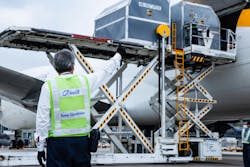How Ground Handlers are Contributing to Aviation’s Sustainability
Sustainability is an important subject in the aircraft ground handling industry. As a result, ground handling companies are increasingly promoting or being involved in sustainability initiatives.
Across the Asia Pacific region, there are many leading examples of sustainability projects being implemented.
Parties Involved
There are multiple parties leading sustainability initiatives in aircraft ground handling. This varies from airport to airport, but in general it is the airports, airlines and ground handling companies that are leading the green initiatives, observes Steven Ng, sales director at ITW GSE Asia Pacific.
“Airports all over the world are beginning to think greener and almost half of global passenger traffic passes through airport carbon accredited airports,” he says. “To date, more airports are showing greater interest in reducing their environmental impact. Often large airports are located close to major cities, meaning cities and airports are coming into ever-closer contact. This leads to stricter requirements in terms of acceptable emissions levels, resulting in a growing interest in electrically powered ground power units (GPUs) and pre-conditioned air (PCA) units, which effectively address the airports’ sustainability goals.”
According to Wilson Kwong, chief executive of Hong Kong Air Cargo Terminals Limited (Hactl), the fragmented and multifaceted nature of the sector does imply that any sustainability direction must be undertaken by multiple interest groups such as airport authorities, ground handling groups and airlines.
“This inevitably slows progress. On the other hand, we are seeing evidence of increasing interest in sustainability in the area of cargo handling, which has long been held back because of limited options for eco-friendly GSE,” he says. “In our own case, our initial interest had to face the limited availability of top-end electric GSE, capable of coping with the heavy weights and intensive use cycles we need. That is now changing, but we are meanwhile focussing on areas which are potentially more productive: such as the use of biodiesel in existing internal combustion engine (ICE) -powered equipment, and our latest move to autonomous electric tractors to tow cargo dollies – helping to solve the challenge of recruitment as well as reducing our carbon footprint.”
Sustainability Initiatives
Within Malaysia’s AeroDarat, ground handling sustainability initiatives mostly come from the collaborative effort between the project management office and the aircraft services and ground support equipment business unit.
“The industry and its people are becoming more aware on the impact of sustainability; thus, spark of interest was seen in last few years to embark on sustainability journey. In our context, we are committed in supporting the sustainability mission of our parent company, Malaysia Aviation Group (MAG), to achieve net zero carbon by 2050. Hence, business entities across MAG are coming out with multiple initiatives to ensure the target is achievable,” explains Mohamad Khairi Ngadiran of AeroDarat’s project management office.
Charles Galloway, dnata’s regional CEO, airport operations – Asia Pacific, highlights that aircraft ground handling sustainability initiatives are an important part of dnata’s green operations strategy.
“This is reflecting our pursuit of the highest standards of environmental efficiency throughout our operations. We are steadfast in our dedication to achieving a 20 percent reduction in both carbon footprint and landfill waste by 2024, followed by a more ambitious 50 percent reduction by 2030,” he says.
From a sustainability standpoint, dnata is continuing to drive digitalization efforts across cargo operations in both Australia and Singapore.
“This allows for improved oversight on a local and global level. It also supports enhanced customer engagement and service excellence, elevating data sharing with all our stakeholders in the air cargo ecosystem and provides enhanced transparency across the cargo handling processes to extend life cycles, reduce waste and update them to the latest safety and quality standards,” affirms Galloway.
Airport Developments
According to Ng, in the Asia Pacific region there is an increase in new airport developments showing increased demand for more environmentally friendly solutions, particularly in countries like Thailand, Hong Kong, Philippines, Vietnam and Singapore.
“One noteworthy project showcasing a strong commitment to sustainability is Bangkok Suvarnabhumi Airport, which has equipped its satellite terminal with electric ground support equipment (eGSE),” he says. “For this project, ITW GSE supplied 36 PCAs, 72 GPUs and 72 hose retrievers, making a substantial impact on reducing carbon emissions. These fixed ground services have the potential to cut carbon emissions by nearly 90,000 metric tons of CO₂ annually at this airport. Additionally, with no need for tractors to tow GPUs and PCAs on the apron, ground safety is also enhanced.”
Understanding the influence business has on the environment and communities, SATS has incorporated sustainability to strengthen long-term value creation and make a positive impact today and in the future, affirms Tan Yen Ling, head of group sustainability at SATS.
“While the board makes certain that sustainability goals are integrated into all programs and business imperatives, executive management at SATS provides stewardship and ensures that our business and strategy are aligned with our sustainability goals,” she says. “To provide a dedicated focus on sustainability, our chief sustainability officer has set up an ESG Steering Committee comprising members from our senior leadership team to establish greater alignment on ESG-related matters and ensure we invest appropriately in critical initiatives to achieve our goals.”
A notable milestone achieved by SATS has been the conversion of 298 tractors, 150 forklifts, three vans and two air tugs in Singapore to electric variants, making a significant stride in increasing the electrification of ground support equipment from 8 percent in the financial year 2020 to 38 percent this year.
“In terms of public interest, according to studies, 2 in 3 UK employees, and 3 in 4 US employees want to work for a company that has a positive impact on the world. More than 50 percent of Gen Z and Millennials research a company’s environmental impact and policies before accepting a job. More than half of respondents said they are ‘really worried’ about climate change, and that aviation should become carbon neutral in the future,” says Tan. “We also see increasing importance placed on sustainability amongst our key stakeholders such as investors, customers and regulators. In Singapore, for example, the Ministry of Transport announced cleaner energy vehicle targets for Changi airside in March 2023, setting a clear direction for all ecosystem stakeholders to work towards to.”
About the Author

Mario Pierobon
Dr. Mario Pierobon provides solutions in the areas of documentation, training and consulting to organizations operating in safety-sensitive industries. He has conducted a doctoral research project investigating aircraft ground handling safety. He may be reached at [email protected].
